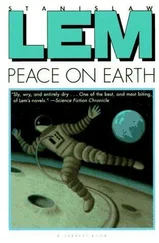For a moment we paused to consider the mentality of the strategists. They never took people seriously, insisting that the important thing was the biological preservation of the species. The famous ceterum censeo speciem preservandam esse became a slogan like all other slogans: words to utter but not a value to be included in the strategic equations. By now we had imbibed enough cognac to amuse ourselves with the vision of generals who, as they were cooked alive, would issue their final orders into a silent microphone — because the ocean floor, like every other nook and cranny on the planet, would no longer offer shelter. The only safe place for the Pentagon and its people, we concluded, would be beneath the bottom of the Moscow River; but it was not too likely that even our daring eagles could manage to get there.
After midnight, we finally put such mundane subjects behind us, and the conversation grew interesting. We took up the Mystery of the Species. I dwell on this, because that dialogue-requiem in honor of Man the Wise, delivered by two representatives of the race who were woozy with caffeine and alcohol, and certain that the end was nigh, seems to me significant.
That the Senders were well informed about the state of things in the whole Galaxy, I opined, was beyond question. Our catastrophe was a consequence of their not having taken into account the specific situation on Earth, and they had not, because Earth was, in the whole Galaxy, an exception.
“These are old Manichean ideas, a dime a dozen,” declared Rappaport.
But I was not at all claiming that the apocalypse was the result of any exceptional human “wickedness.” It was simply that every planetary psychozoic enclave passed from a state of global division to one of integration. From bands, tribes, and clans arose nations, kingdoms, empires, world powers, and finally came the social unification of the species. This process almost never led to the emergence of two antagonists of equal strength, at least not immediately prior to the final joining; there would be, rather, a Majority in opposition to a weak Minority. Such a confrontation had much greater probability, even if only from a strictly thermodynamic point of view; one could demonstrate this by stochastic calculation. A perfect equilibrium of forces, an exact equals-sign between them, was a state so improbable as to be virtually impossible. One could arrive at such a balance only by coincidence. Social fusion was one series of processes, and the acquiring of instrumental knowledge was another series.
Integration on the scale of a planet could become “frozen” at a stage along the way if the discovery of nucleonics arose prematurely. Only in that case would the weaker side become equal to the stronger — inasmuch as each of them, wielding atomic weapons, could wipe out the entire species. Certainly social integration always occurred on a foundation of technology and science, but the discovery of atomic energy would ordinarily take place in the post-unification period — and then it would have no dire consequences. The self-imperilment of the species, or its tendency to commit involuntary suicide, was no doubt a function of the number of primitive societies that possessed the “ultimate weapon.”
If on some globe there were a thousand hostile governments, and each had a thousand nuclear warheads, the chance of a purely local conflict’s snowballing into an apocalypse would be many times greater than if there existed only a few antagonists. Therefore, the relation between the two calendars — one calendar showing the sequence of scientific discoveries, and the other recording the progress of the amalgamation of the separate societies — determined the fate, in the Galaxy, of each individual Psychozoic. We on Earth definitely had bad luck: our passage from preatomic civilization to atomic took place atypically, too early, and it was this that had caused the “freezing” of the status quo, until the advent of the neutrino emission. For a planet united, the cracking of the letter would be something positive, a step toward entering the “club of cosmic civilizations.” But for us, in our situation, it was a knell.
“Maybe,” I said, “if Galileo and Newton had died of whooping cough in childhood, physics would have been delayed enough so that the splitting of the atom would not have come about until the twenty-first century. That whooping cough that never was might have saved us.”
Rappaport accused me of falling into journalism: physics was ergodic in its development, and the death of one or two people could not have influenced its course.
“All right,” I said, “then we might have been saved by the emergence, in the West, of some other dominant religion than Christianity — or, millions of years earlier, by a different formation of man’s sexual nature.”
Challenged, I took up the defense of this thesis. It was no accident that physics had arisen in the West as the “queen of empiricism.” Western culture was, thanks to Christianity, a culture of sin. The Fall — and the first one had been sexual! — engaged the whole personality of man in melioristic pursuits, which provided various types of sublimation, with the acquiring of knowledge at the head.
In this sense Christianity favored empiricism, though, of course, unwittingly: it opened the possibility for it and gave it the chance to grow. Characteristic of the East and its cultures, on the other hand, was the category of shame — quite central — because a man’s inappropriate action there was not “sinful” in any Christian sense, but at most disgraceful, and mainly in the external sense: having to do with the forms of behavior. Therefore, the category of shame transferred man, as it were, “outside” the soul, into the realm of ceremonial practices. For empiricism, then, there was simply no place; the chance for it disappeared with the deprecation of substantive action, and instead of the sublimation of drives, their “ceremonialization” was provided for. Vice, no longer the “fall of man,” became detached from the personality and was, so to speak, legally channeled into a separate repertoire of forms. Sin and grace were replaced by shame and the tactics of avoiding it. There was no penetration into the depths of the psyche: the sense of “what is proper,” “what ought to be,” took the place of the conscience, and the finest minds were directed toward the renunciation of the senses. A good Christian could be a good physicist, but one could not become a physicist if one was a good Buddhist, Confucianist, or follower of the Zen doctrine, because then one would be occupying oneself with the very thing those faiths deprecated in toto. With this as a point of departure, social selection gathered the entire “intellectual cream” of the population and allowed it to spend itself only in mystical exercises — yoga, for instance. Such a culture acted like a centrifuge; it cast the talented away from the places in society where they could initiate empiricism, and stoppered their minds with an etiquette that excluded instrumental pursuits as “lower” and “less worthy.” But the potential of egalitarianism inherent in Christianity — though it came into conflict with class structures, though for periods it yielded to them — never altogether disappeared, and indirectly from it sprang physics, with all its consequences.
“Physics — a kind of asceticism?”
“Oh, it is not that simple. Christianity was a mutation of Judaism, which was a ’closed’ religion in that it was intended only for the chosen. Thus Judaism was, as a discovery, something like Euclidean geometry; one had only to reflect on the initial axioms to arrive, by extrapolation, at a more general doctrine, one that under the heading ’chosen’ would put all people.”
Читать дальше












